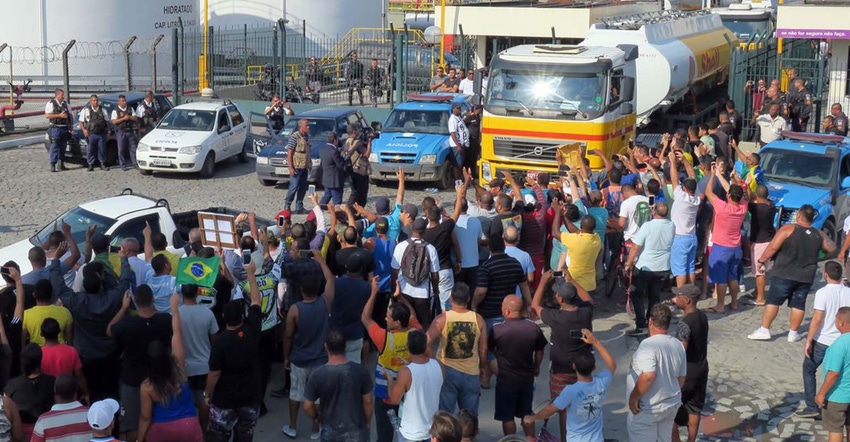
A truckers’ strike over rising fuel prices could end up costing a lot of bean, meal and oil sales, said the head of the Brazilian Oilseed Processors’ Association.
Brazil had forecast about $37 billion in income this year of soy complex exports, part of which may now be threatened. The strike and protests, which choked traffic and blocked delivery of goods started early last week. By the weekend 20 of Brazil’s 26 states reported nearly 600 traffic-coagulating truckers’ protests on roadways, according to news reports.
Since about 80% of everything going from one city to another in Brazil travels by eighteen-wheeler, everybody’s been suffering. But those in the ag sector are really taking it on the chin as roads to ports are frequent targets of the protests and blockages connected with the strike. Already stocks of beans, meal and oil are dropping steadily at ports, and according to the head of Brazil’s processors’ association, Andre Nassar, “Every day without exports, that’s 320,000 metric tons of meal and beans not exported.”

Fuel shortage nationwide
Meanwhile, motor fuel at the pump is running short nationwide, and by the time you were getting out the grill for Memorial Day weekend the Federal Highway Police had issued at least 349 fines for protesters blocking roadways, at an estimated value of over half a million bucks. By Saturday, the military was called in to help escort fuel tanker trucks to refineries. Motor fuel got scarce in several cities.
So why the fuel price increases?
Until last year, Brazil’s government—acting through state oil company Petrobras—manipulated consumer fuel prices to help tamp down inflation. When prices got high, Petrobras needed to step in and import petroleum, then sell it to refineries at a lower cost than they had paid. But that made Petrobras’ debt shoot to what’s been estimated at $125 billion. Keeping inflation down that way was costing a lot of money, and intervention in free markets is always a costly business. So Petrobras was set free last summer to follow a more realistic market price program.
Brazilian currency weakens
Meanwhile interest rate reductions in the United States have helped make Brazil’s currency weaker. And that hurts when it’s time to buy petroleum, whose price, like that of soybeans, is set in the U.S. In dollars.
Truckers aren’t the only ones suffering. Brazil’s National Agriculture Confederation—whose initials in Portuguese are CNA-- urged an end to the highway protests, saying they had already caused “grave damages,” to the country’s agriculture, and, in some cases those damages were “irreparable.”
CNA President Joao Martins declared, “Perishable products are being lost due to the blockage of the highways. Inputs for animal feed are not getting to production centers, causing the death of animals… The milk, poultry and pork production chains are being seriously affected… and (feed mills) are unable to receive inputs and get production out.”
Higher farm operating costs
Observers like Martins point out that Brazilian truckers suffer once as a result of higher pump prices; but Brazilian farmers pay twice. Not only in higher fuel costs, but in higher overall operating costs. Their product leaves the farm on semis and their inputs all get there that way, too, making it costlier to grow each acre of crop. And that’s before you figure in the cost of running all that heavy farm equipment in the production process.
Until the strike ends, though, bad news for Brazil could be some short-term good news for you. Port facilities are running out of beans to load, and it seems riskier to send ships there to pick up product right now. During the last truckers’ strike three years ago— again mostly over fuel prices, the line of foreign ships waiting to soybeans at Brazilian ports didn’t shorten.
Officials worked through Saturday and reportedly came up with patches to help meet at least three of the demands on the truckers’ list, including a 10% reduction in what Petrobras charges to refineries, better forecast future price increases, and a change in tolls per axle on tollways.
By Sunday, Brazilian president Michel Temer had issued decrees designed to cut diesel pump prices by about 50 cents per gallon for the next 60 days—a measure that one minister says will cost $1.7 billion. He also used his power to issue temporary decrees to address other trucker demands, including a rule that price increases can only be made monthly from here on out. But so far, the truckers have not formally agreed to return to work, and the number of traffic blockages or slowdowns on Brazilian roads climbed to more than 700.
There’s been no word yet on the truckers’ response, but stocks of beans at Brazilian export terminals were dwindling by the weekend, leaving exporters biting their nails. Stay tuned.
The opinions of the author are not necessarily those of Farm Futures or Farm Progress.
About the Author(s)
You May Also Like






